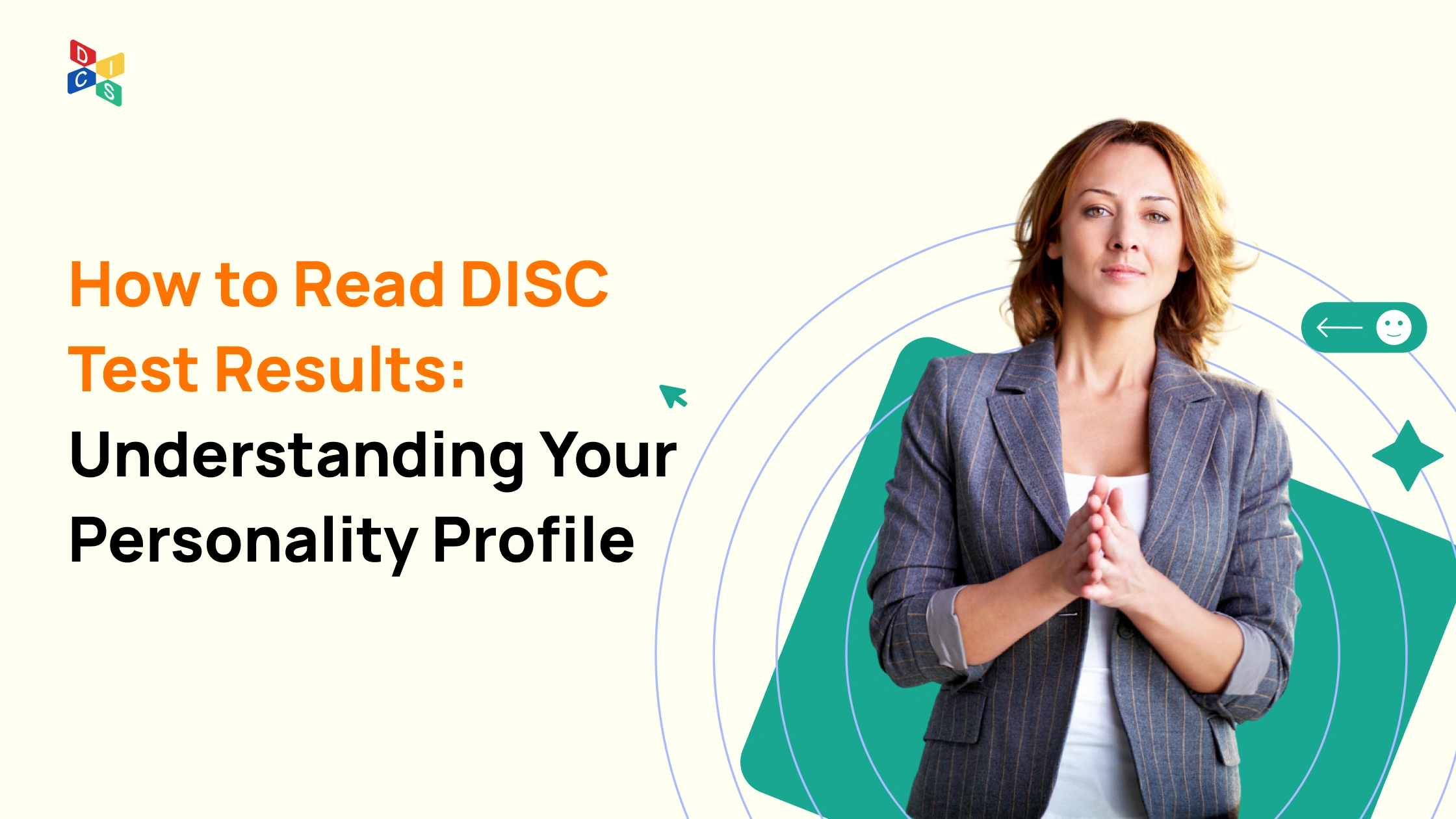Table of content
What are the Most Common DISC Personality Types and Why It Matters
Discover the 5 most common DISC personality types and why they matter. Learn key traits, strengths, and how to work better with each type and blend.
What are the most common DISC personality types, and why should you care? Whether you're trying to build stronger teams, improve communication, or just understand yourself better, knowing this can be a game-changer. In this blog, we’ll break down the top 5 most frequent DISC types and blends, explain why they show up so often, and how you can work effectively with each.

What are the DISC Personality Types?
When people take a common DISC types test, they are assessed across four main behavioral categories: Dominance (D), Influence (I), Steadiness (S), and Conscientiousness (C). Each style is a particular way of thinking, speaking, and responding to events and people.
- Dominance (D): Competitive, results-oriented, and forthright. D-types are motivated by outcomes and action.
- Influence (I): Extrovert, passionate, and persuasive. Social interaction and recognition are crucial to I-types.
- Steadiness (S): Loyal, patient, and reliable. Harmony and stability are key for S-types.
- Conscientiousness (C): Analytical, careful, and systematic. C-types prioritize logic and consistency.
Although each person may prefer one dominant style, most people are a mix of two or more. As a result, the most common DISC personality types are combined into blends such as IS, SC, or CS, which provide a more realistic picture of behavior in the real world.

If you’re curious about your profile, try taking the Comprehensive Test Deck for accurate insights into your behavioral style.
5 Most Common DISC Personality Types
Despite the DISC model's four primary categories, the majority of people are a blend of two or more types. These are the five most common DISC types discovered in corporations, teams, and personality testing.
S (Steadiness) - The Supporter
S personalities, one of the most common DISC personality types, account for around 30–35% of the population. They are often the quiet center of a team or group. The S personality type is characterized by calmness, trustworthiness, and teamwork. Consistency, loyalty, and harmony are crucial to them.

Strengths of S Types:
- Patient and empathetic
- Excellent listeners and team players
- Loyal and reliable under pressure
- Consistent and committed
Weaknesses of S Types:
- Resistant to change
May avoid conflict or confrontation - Can struggle with fast-paced environments
How to Work With S Types:
- Be patient and provide clear expectations
- Create a stable, collaborative environment
- Show appreciation for their loyalty and efforts
SC (Steadiness + Conscientiousness) - The Analytical Supporter
SC personalities represent about 15–20% of the population. SCs blend the correctness and logic of C with the composed, dependable quality of S. They like an ordered approach and are systematic and thoughtful. This combination represents one of the most common DISC personality types in analytical roles.
Strengths of SC Types:
- Detail-oriented with strong follow-through
- Consistent, disciplined, and dependable
- Excellent at planning and organization
- Thoughtful decision-makers
Weaknesses of SC Types:
- May overanalyze or hesitate with decisions
- Can be uncomfortable with ambiguity
Avoids risks or emotionally charged situations
How to Work With SC Types:
- Provide clear instructions and time to prepare
- Avoid rushing them or forcing quick decisions
- Respect their need for order and logic
- Be calm, respectful, and avoid confrontation
IS (Influence + Steadiness) - The Amiable Connector
The IS blend accounts for roughly 12–15% of the population. IS types are kind, helpful, and people-oriented. They are warm and supportive, and they excel at maintaining group morale because they blend friendliness (I) and loyalty (S). They are unique among the most common DISC profiles in cooperative or customer-facing roles.

Strengths of IS Types:
- Approachable, empathetic, and personable
- Loyal and supportive teammates
- Good at resolving conflicts and boosting morale
- Natural communicators
Weaknesses of IS Types:
- May avoid hard conversations
- Can struggle with prioritizing tasks over people
- Tends to say "yes" too often
How to Work With IS Types:
- Be friendly and personable
- Offer emotional encouragement and positive feedback
- Be mindful not to overwhelm them with high-pressure tasks
- Foster a warm, people-first environment
Explore More: Is Personality Type In Disc: Traits, Strengths & How To Work With Them
I (Influence) - The Enthusiast
Pure I types make up about 10–12% of the population. I personalities are outgoing, optimistic, and enthusiastic. They are loud, persuasive, and thrive on social interaction. They instill life wherever they go, making them one of the most common DISC personality types in leadership, sales, and marketing.
Strengths of I Types:
- Inspiring and motivating
- Excellent communicators
- Creative and enthusiastic
- Build relationships quickly
Weaknesses of I Types:
- Can be disorganized or easily distracted
- May struggle with follow-through
- Often avoid tasks they find boring
How to Work With I Types:
- Keep communication upbeat and engaging
- Allow space for creativity and expression
- Help them stay focused with gentle structure
- Acknowledge their contributions publicly
CS (Conscientiousness + Steadiness) - The Cautious Analyzer
CS blends represent approximately 8–10% of the population. CS types are accurate, consistent, and reliable. They are conscientious problem solvers who respect consistency and clarity because they mix C's systematic thinking with S's collaborative approach. This combination is one of the most common DISC personality types, especially in technical or quality-focused occupations.
Strengths of CS Types:
- High standards and attention to detail
- Dependable and quality-focused
- Loyal, careful, and cautious decision-makers
- Calm and composed under pressure
Weaknesses of CS Types:
- May be overly critical or perfectionistic
- Can resist new ideas or changes
- May struggle to take initiative without full information
How to Work With CS Types:
- Offer well-organized, data-driven communication
- Respect their need for precision and time
- Avoid putting them on the spot or rushing decisions
- Show appreciation for their thoroughness and consistency
Wondering how DISC compares to other personality frameworks? Here’s a detailed comparison of DISC vs MBTI to help you decide which one fits your needs.
Why These DISC Types Tend to Be Common
Have you ever wondered why some DISC profiles keep appearing in groups, organizations, and even friendships? S, SC, and IS, the most common DISC personality types, are more than just statistical anomalies. These personality types predominate for a variety of social, psychological, and practical reasons.

Workplace Culture Rewards Stability and Cooperation
Soft skills such as empathy, reliability, and composed communication are essential in today's collaborative work environments. As a result, S and IS types are among the most common DISC personality types because they place a high importance on emotional connections and team cohesion. An IS (Influence + Steadiness) personality type, for example, ensures that everyone feels included while also bringing enthusiasm to team meetings. This type of balance is not only desirable, but also required in jobs such as community development, customer service, and human resources.
People Gravitate Toward Socially Favorable Traits
Because free DISC tests are self-evaluative, participants usually reply based on how they want to be regarded or how they see themselves. Most cultures value attributes such as cooperation (SC), friendliness (I), and assistance (S). As a result, if someone is unsure, they may select answers that align with their ideals. For example, if someone works for a business that values teamwork and emotional safety, they may choose more consistent answers, even if they lean more toward D.
Cultural Norms Influence Trait Development
People's means of expressing themselves are impacted by the values that different civilizations hold. Many cultures, particularly collectivist ones, instill the values of stability (S) and conscientiousness (C), humility, consideration, and group orientation in children from an early age. The most common DISC personality types that suit those norms become more widespread as these values are reiterated over time in the business, homes, and schools.
Why Knowing the Most Common Type Matters
Knowing the most common DISC personality types is not only fascinating. It is also quite helpful, particularly if you work in team-based settings like leadership or human resources. Understanding the most prevalent personality types facilitates better communication, stronger bonds with others, and more people-focused decision-making.

- Helps You Connect with the Majority: Understanding the communication style of S, IS, or SC types gives you an advantage if they make up a significant portion. For example, across common DISC styles around the world, personalities like IS or SC are often favored for their adaptability in both structured and social settings. Knowing the common DISC profiles allows you to tailor your plan such that it appeals to the majority.
- Improves Team Dynamics and Reduces Conflict: When you understand what motivates each individual, teams operate more efficiently. When a coworker with a high SC profile takes their time making judgments, it is a good sign that they are methodical and appreciate structure and facts. This knowledge improves respect and reduces misunderstandings, particularly among the most common DISC personality types.
- Guides Better Hiring and Role Placement: Understanding DISC types helps match individuals with roles that play to their strengths throughout the hiring or role-assignment process. An IS type is excellent at community outreach, but someone with a CS background may excel at data analysis or compliance. Understanding the most common personality type helps groups achieve harmony and balance.
- For example, across common DISC styles around the world, personalities like IS or SC are often favored for their adaptability in both structured and social settings.
For a creative and fun take on DISC types in action, check out how the Symbiote family fits into the DISC model - might be surprised who you relate to most!
Final Thought
For good reason, the most common DISC personality types—S, SC, IS, I, and CS—occur frequently. They demonstrate characteristics that promote cooperation, confidence, and steady growth in both private and professional settings. Understanding these key personality traits can help you form stronger bonds with others and reduce unnecessary conflict. No DISC type is preferable to another, but understanding the most common types can help you alter your communication, improve teamwork, and promote a more effective workplace.
While this guide focuses on the most common DISC types, if you identify more with a “Dominant” profile, you might find this list of DISC D personality type careers especially useful.
FAQs
What is the most common DISC personality type?
S (Steadiness) is the most common DISC personality type in the world, especially in cultures that value harmony and team alignment. This personality trait is associated with loyalty, patience, and peace. They are a stabilizing force in social and team settings because they appreciate harmony, stability, and supportive relationships. As a result, when discussing the most common DISC personality types, S-types typically appear at the top of the list.
Are DISC blends more common than single types?
Yes, generally, DISC blends are more common than pure single DISC types. Most people can adjust to a wider variety of environments because they naturally combine two strong characteristics. Most of the most common DISC personality types in today's teams and organizations are also made up of these combinations.
Are the most common DISC types more successful?
No, not always. Every DISC profile has unique strengths; thus, success is not limited to any of them. Being one of the more common DISC personality types, however, may be useful in some situations that value dependability, teamwork, or emotional intelligence. Finally, self-awareness and adaptation, rather than personality type, determine success.
Are DISC personality types fixed, or can they change?
Your behavior may vary depending on your environment, role, or life events, even if your underlying DISC type remains consistent over time. For example, even if someone generally identifies as an IS type, they may prefer a C style in a position that needs a high level of attention to detail. This adaptability illustrates the ubiquity of blends and how understanding the most common DISC personality types aids in navigating a wide range of real-world scenarios.
If certain DISC types are more common, does that mean other types are less valuable in a team?
Not at all. Each DISC personality type brings valuable insights and strengths to a team. Having people with a variety of DISC types is critical for a well-rounded and effective team, even if some are more prevalent in the general population at large. Each approach contributes uniquely to innovation, problem-solving, and overall team performance.


Don't Let Your Potential Stay Hidden!
Take the DISC test today and discover your unique 'YOU', with deep insights into your true personality and potential.

Represents your instinctive behaviors and desires.
Shows the behavioral tendencies you think you should exhibit in specific situations.
Related articles
You may also be interested in
 DISCJan 06, 2026
DISCJan 06, 2026DISC Personality Test for Sales: Unlock Your Team’s Full Potential
DISC Personality Test for Sales helps sales teams improve role fit and performance. Learn how DISC boosts hiring, coaching, and customer alignment.
 DISCJan 06, 2026
DISCJan 06, 2026How to Read DISC Test Results: Understanding Your Personality Profile
Learn how to read DISC test results and understand your personality profile. Discover how DISC can enhance communication, teamwork, and career growth.
 DISCDec 31, 2025
DISCDec 31, 2025What Is Group Culture? How Team Behaviors Shape Workplace Success
Discover what is group culture and how it shapes team dynamics, decision-making, and performance. Learn how the DISC model can help improve your team’s culture.
